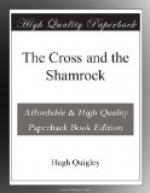tongue. Now all the talk, articles, and “leaders”
go for nothing, since Mr. Goldrich acknowledges “the
priest is right; she is his sister.” But
did not that clamorous press, that bellowed and hallooed
on the rabble to rob, murder, and destroy,—did
it not recall its words, apologize for its naughty
language, and retract every charge groundlessly made?
Like a convicted felon, did it cry
peccavi—I
have sinned, been misled, or misinformed? No;
not a sign of repentance has been manifested, not
an apology made, not a word of retraction uttered
by these self-styled philosophers of the press, who
think they are responsible to no law, human or divine,
and who say they have a world to redeem, and nations
and peoples to regenerate. We have read countless
folios of calumnies, misrepresentations, and black
libels on every thing sacred and venerable on earth,
by the American press, during several years that we
have read newspapers; but we never yet found one editor
to retract, apologize, or mend his manners and language,
except when compelled by the cudgel or by the law.
What an anomaly does the observation of the conduct
of the world present to us! They refuse “to
hear the church,” or be guided by the teaching
of men who have spent their lives in preparing and
qualifying themselves for the office of public teaching;
and they submit themselves blindly and without control
to the guidance of men whom they know not, who have
not always the best moral characters, and whose training,
in most instances, does any thing but qualify them
for the dangerous office they fill.
The instance which is here given of the almost unanimous
hostility of the press to the cause of justice, truth,
and honor, illustrates what we say; and the obvious
conclusion is, that the “fourth estate”
itself needs reclaiming—the great modern
reformer needs reformation.
Soon after Mr. Goldrich’s return home, he called
on Father Paul O’Clery, and, with a great deal
of good nature, congratulated him on his very providential
discovery of his sister, “my dear adopted child.
And now, reverend sir,” said he, affectionately,
“I beg to tender you the hospitalities of our
house. As your sister has been for so many years
one of the family,—and not the least loved
one, I assure you,—I hope I may, without
impropriety, by right of relationship by adoption,
claim you as a member also.”
Father Paul answered by assuring him he appreciated
his kindness; that he acknowledged the honorable connection
in full; and that, though this very affectionate advance
had not taken place, Mr. Goldrich would ever be regarded
by him with feelings of veneration and love, on account
of his affectionate kindness to his sister, in giving
her such a superior education, and treating her on
terms of equality with his own children. The
highminded and liberal gentleman, after having shed
tears at the idea of losing his dear adopted girl,
departed, having previously extorted a promise from
Father Paul to attend a great party in honor of Aloysia,
at the palace, on the evening of the next day.




